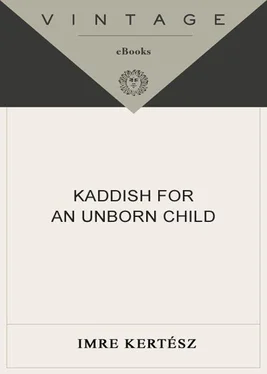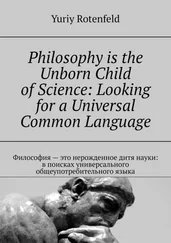Imre Kertész - Kaddish for an Unborn Child
Здесь есть возможность читать онлайн «Imre Kertész - Kaddish for an Unborn Child» весь текст электронной книги совершенно бесплатно (целиком полную версию без сокращений). В некоторых случаях можно слушать аудио, скачать через торрент в формате fb2 и присутствует краткое содержание. Год выпуска: 1990, ISBN: 1990, Издательство: Vintage, Жанр: Современная проза, на английском языке. Описание произведения, (предисловие) а так же отзывы посетителей доступны на портале библиотеки ЛибКат.
- Название:Kaddish for an Unborn Child
- Автор:
- Издательство:Vintage
- Жанр:
- Год:1990
- ISBN:9780307426499
- Рейтинг книги:3 / 5. Голосов: 1
-
Избранное:Добавить в избранное
- Отзывы:
-
Ваша оценка:
- 60
- 1
- 2
- 3
- 4
- 5
Kaddish for an Unborn Child: краткое содержание, описание и аннотация
Предлагаем к чтению аннотацию, описание, краткое содержание или предисловие (зависит от того, что написал сам автор книги «Kaddish for an Unborn Child»). Если вы не нашли необходимую информацию о книге — напишите в комментариях, мы постараемся отыскать её.
As Kertész’s narrator addresses the child he couldn’t bear to bring into the world he ushers readers into the labyrinth of his consciousness, dramatizing the paradoxes attendant on surviving the catastrophe of Auschwitz.
is a work of staggering power, lit by flashes of perverse wit and fueled by the energy of its wholly original voice.
From the Trade Paperback edition.
Kaddish for an Unborn Child — читать онлайн бесплатно полную книгу (весь текст) целиком
Ниже представлен текст книги, разбитый по страницам. Система сохранения места последней прочитанной страницы, позволяет с удобством читать онлайн бесплатно книгу «Kaddish for an Unborn Child», без необходимости каждый раз заново искать на чём Вы остановились. Поставьте закладку, и сможете в любой момент перейти на страницу, на которой закончили чтение.
Интервал:
Закладка:
“No!” I had said instantly and at once, without hesitation and, so to say, instinctively since it has become quite natural by now that our instincts act contrary to our instincts, that our counterinstincts, so to say, act instead of, indeed as, our instincts; yes, I was seeking to get back at Dr. Obláth — Dr. Obláth, doctor of philosophy, that is to say for all that idiotic blather, for my own voluntary and in no way justifiable (though I had plenty of justifications for it, a few of which I have already spelled out above, to the best of my recall) degradation in portraying him there, slap-bang in the middle of the emaciated beech wood (or linden grove, for all it matters), the way that I portrayed him, though the peaked-cap, the loose-fitting raglan overcoat, as well as the whey-colored eyes and the big, soft face like lumps of kneaded and risen dough, I still maintain, do indeed, accord fully with reality. It is just that it could all have been described otherwise, in a more balanced fashion, more considerately, perhaps even — and this is saying something— with a fection ; but, I fear, the only way I can describe anything now is with a pen dipped in sarcasm, derisively, perhaps even a touch humorously (it’s not my place to judge that), yet also in certain respects lamely, as if someone were constantly jerking back my pen when it is poised to set down certain words, so that in the end my hand writes other words in their stead, words that will simply never round out into an affectionate portrait, perhaps simply because, I fear, there is no a fection in me, but then — for heaven’s sake! — for whom might I feel affection; and why? Yet Dr. Obláth spoke endearingly enough, at least enough for me to record in final (I almost said fatal) form several of his more piquant observations, since they aroused my attention. The fact that he was childless, he said, that he had no one apart from an aging wife who was struggling with the problems of aging, if I understood him right, since the philosopher formulated it more opaquely or, one could also say, more discreetly than that, trusting me to understand what I wish to understand, and even though I did not have wish to, I did of course understand all the same. That this matter of his childlessness, Dr. Obláth continued, had actually struck him only recently, but then very often, indeed this was precisely what he had been pondering just now on the woodland path and, lo and behold, he could not forbear to speak about it, presumably because he too was aging and, as a result, certain possibilities — for instance, the possibility of still having a child — were slowly no longer possible for him, indeed were impossible, and that in fact he had only begun to think much about this quite recently, and more specifically, he said, thinking of it “as a missed opportunity.” At this point Dr. Obláth halted on the path, for in the meantime we had set off again, two social beings, two men conversing on the forest litter, two sad blots on a landscape painter’s canvas, two blots which in their essences shattered a natural harmony that has probably never existed, only I don’t remember whether it was I who joined step with Obláth to accompany him or he who joined step with me, but then one is not going to make this a matter of prestige: yes, naturally it was I who joined step with Obláth, most probably in order to shake him off because that way I would be able to turn back at a later point of my own choosing; so anyway, at this point Dr. Obláth came to a halt on the pathway and with a single melancholy gesture stiffened his doughy or even, here and there, puffily exuberant countenance, for he threw back his head, together with its impertinent, rakish cap, to fix his gaze on a tree branch opposite as if on a pitiful, ragged yet, even in its castoffness, still serviceable item of clothing. And while we stood there in this way, mutely, I in Obláth’s and Obláth in the tree’s axis of attraction, I was assailed by the feeling that I was about to become party to a presumably confidential utterance by the philosopher; and that is indeed what happened when Dr. Obláth finally spoke, and he said that in saying that he felt what had happened — or rather what had not happened — was a missed opportunity he was not thinking of continuity, that somewhat abstract and yet, let’s be honest, basically satisfying solace of knowing he had fulfilled — or rather, and that was precisely the point, not fulfilled — his personal and suprapersonal business on this earth, that is, the business, over and above sustaining his existence, of the prolonged and propagated perpetuation and survival of that existence, and thereby of himself, in descendants, which (beyond sustaining one’s existence) is, one might say, man’s transcendental albeit highly practical duty in life, so as not to feel incomplete, superfluous and, ultimately, impotent; nor was he even thinking of the impending prospect of an old age without support, no, but in truth he feared something else: “emotional sclerosis,” as he put it, those were his exact words, meanwhile setting off again along the path, ostensibly heading towards our base, the holiday home, but in reality, as I now knew, towards emotional sclerosis. And I stepped to join him as a faithful companion on this journey of his, duly disconcerted by his disconcerting words though not sharing his fear so much — a fear which, I fear (or rather, to be more accurate, I trust, indeed am sure), is merely momentary and sacred only insofar as it is to be dipped in eternity, as in some font of consecrated water so to speak, because when it eventually comes to pass we shall no longer fear it, no longer even remember that this was what we had once feared, since by then it will have overwhelmed us and we shall be sitting up to our necks in it, it will belong to us and we to it. Because this too is just a hoe’s scratch towards the trench, the burial pit that I am digging in the air (because there I shall be able to lie down in comfort), and perhaps that is why, as I say (though I don’t say it to the philosopher, just to myself), there is no need to fear emotional sclerosis, one should accept it, if not positively welcome it, like a helping hand extended towards us which, for all that it is undoubtedly helping us towards the trench, is still helping nonetheless; because, Mr. Kappus, the world is not against us… if dangers are at hand, we must try to love them ; but then, I interject (though I do not address this to the philosopher, nor even to Mr. Kappus, the lucky dog to have got so many letters from Rainer Maria Rilke, I just say it to myself) that I am already at the point where I love these dangers to the exclusion of all else , though I suppose that is not quite right either, it too carries a false note that I perpetually pick out, just like an orchestral conductor who immediately detects from the tutti if, let us say, the cor anglais tootles a note a semitone sharp on account, let us say, of a misprint that has crept into the score. And I perpetually pick out this sour note, not just within me but also around me, within my more immediate and my broader, what I might call cosmic surrounds, like here, in this lap of shifty Nature, within the surrounds of the sickly oaks (or beeches), the stinking brook and the mucky-hued canopy glimmering through the consumptive foliage, where I, my dear Mr. Kappus, never feel an intimation of any “thought of being a creator, of procreating, of making”—a thought that, wouldn’t you agree, is nothing without its continuous great confirmation and realization in the world, nothing without the thousandfold concordance from things and animals … Yes, because for all that they have put a dampener on us or jaded our spirits (to say no more about it than that), surreptitiously, if we pay quiet and close attention to the circulation of our blood and our alarming dreams, surreptitiously — and only in this do I sense a thousandfold concordance which rings out from everything and everybody — we still, always and unwaveringly, wish to live, this lethargically, this dispiritedly, this sickly, yes, even like this and even if we are unaware of even that much and unable to live even that much… For that very reason, and also in order to avoid becoming bogged down in this sentimental mood, in which, as in almost everything, by the way, or at least everything in which I too play a part, I yet again clearly heard the sour note of the cor anglais, I posed him a question that very much pertained to his professional domain, a question that though philosophical was perhaps not the slightest bit sophisticated, as to Why this is the way it is, all this decrepitude? Where and when had we finally “got rid of our rights”? Why is it no longer possible to know so inexorably and so definitively what we know? and so on and so forth, as if I didn’t know what I know, but driven by my irrepressible compulsion to speak, by some dread, some horror vacui ; and on Dr. Obláth’s face there now resettled the countenance of a professional philosopher and professional intellectual, middle-aged, of medium build, middling means, middling talents and middling prospects professing middling views on a mediocre mid-Hungarian hill range, and the wrinkles of his cynical, happy smile completely engulfed the slits of his eyes. His voice too immediately recovered its objectivity, even objectivism, that well-oiled, habitually hair-splitting and in fact self-assured voice, which had merely faltered momentarily just beforehand at the threatening proximity of real-life things; and so we strolled homewards, two, in point of fact, well-dressed, well-fed, well-preserved, middle-aged, mediocre intellectuals professing middling views, two survivors (each of us in his own different way), two still living, two half-dead individuals, and we discussed, quite superfluously, the sorts of things that can still be discussed between two intellectuals. We discussed, peaceably and desultorily, why it is not possible to be; how the very sustenance of life is, in point of fact, sheer bad manners since, in a more elevated sense and looked at from a more elevated perspective, it ought not to be permissible to be, simply by virtue of events and the continual recurrence of events, let that much suffice, that is reason enough; not to speak of the fact that more erudite minds already proscribed being from being long, long ago. Another thing that was brought up — I cannot recall everything, of course, for hundreds upon hundreds of similar conversations buzzed or rather echoed hollowly in a conversation that had come about as a result of pure confusion and accident, in the way that in one creative thought a thousand forgotten nights of love revive, filling it with sublimity and exaltation —I cannot, in truth, recollect everything, but I believe another thing that was brought up was: Is it not possible that the entire seemingly unknowing effort of being that is directed towards being is by no means a sign of some impartial naïveté, which would be an exaggeration and, in point of fact, impossible, but, on the contrary, a symptom that it can continue only this way, unknowingly, if it must continue at all costs. And only if survival is successful, and of course (Dr. Obláth), it can only succeed on a more elevated plane, although (duet) not even the faintest signs point to this, to be frank quite the opposite, namely, a descent into unknowingness shows itself to be the case… Furthermore, that knowing unknowingness and the syndromes of schizophrenia obviously… And yet furthermore, this means that the experiencing (I) and reification (Dr. Obláth) of the state of the world to which every state of the world tends, in the absence of faith, culture and other official devices, is nowadays only a disaster… And so we tootled on, tootling the sour-toned cor anglais as on the crowns of the motionless, torpid trees there settled a hazy blue twilight mist, tucked away deep within which, like a dense nucleus, lay the more solid mass of the holiday home, where a laid supper table awaited, a presentiment of soon-to-be-rattling cutlery, clinking glasses, a swelling susurrus of conversation, and out of this stark fact came a plaintive sigh of the sour-toned cor anglais; nor can I pretend to myself that I did not, after all, turn back in order to shake Dr. Obláth off: spellbound and as a result of the emptiness concealed by my compulsion to speak and the bad conscience (disgust) that I felt on account of this emptiness, who knows why, but undoubtedly on account of this emptiness, I stayed with him to the very end in order not to hear, not to see and not to have to speak about what I ought to speak — indeed who knows? — perhaps even write about. Yes, and the night bestowed its punishment — or was it a reward? — for all this, bringing a turn in the weather, a sudden windstorm, claps of thunder and huge strokes of balefully flickering lightning that plowed right across the entire sky then decayed as zigzag hieroglyphics and dry, laconic, clearly — (at least for me clearly) — legible letters, each one a
Читать дальшеИнтервал:
Закладка:
Похожие книги на «Kaddish for an Unborn Child»
Представляем Вашему вниманию похожие книги на «Kaddish for an Unborn Child» списком для выбора. Мы отобрали схожую по названию и смыслу литературу в надежде предоставить читателям больше вариантов отыскать новые, интересные, ещё непрочитанные произведения.
Обсуждение, отзывы о книге «Kaddish for an Unborn Child» и просто собственные мнения читателей. Оставьте ваши комментарии, напишите, что Вы думаете о произведении, его смысле или главных героях. Укажите что конкретно понравилось, а что нет, и почему Вы так считаете.












